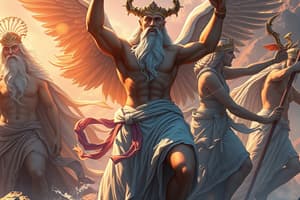Podcast
Questions and Answers
What does the term 'athlos' signify in its relation to athletic competition?
What does the term 'athlos' signify in its relation to athletic competition?
- A mythical creature
- A form of ritual purification
- A historical account
- A contest for a prize (correct)
What does the term 'alexikakos' imply when associated with Heracles?
What does the term 'alexikakos' imply when associated with Heracles?
- Champion of strength
- Defender from evil (correct)
- Ritual cleanser
- Bearer of the lion's skin
What significant aspect of the Nemean lion's skin represents Heracles' strength?
What significant aspect of the Nemean lion's skin represents Heracles' strength?
- It is a magical artifact
- It is impenetrable (correct)
- It is made of diamond
- It grants invincibility
Which source provides key mythographic narratives in Greek mythology?
Which source provides key mythographic narratives in Greek mythology?
What does the term 'miasma' refer to in the context of mythology?
What does the term 'miasma' refer to in the context of mythology?
Flashcards
Athlos
Athlos
A contest for a prize, the origin of the word 'athlete'.
Miasma
Miasma
Ritual pollution that requires purification. A person affected by miasma might face bad luck or misfortune.
Alexikakos
Alexikakos
A 'defender from evil' often associated with Heracles, who is considered a protector.
Primary Sources
Primary Sources
Signup and view all the flashcards
Mythography
Mythography
Signup and view all the flashcards
Study Notes
Athlos and Athlete
- Athlos means a contest for a prize, related to the word "athlete."
Nemean Lion's Skin
- The Nemean lion's skin is impenetrable, symbolizing Heracles' strength.
Mythographic Sources
- Apollodorus' Library is a key source for Greek mythology.
- Diodorus Siculus' Bibliotheca Historica provides historical context for myths.
Miasma
- Miasma refers to ritual pollution needing purification.
Alexikakos
- Alexikakos means "defender from evil," often associated with Heracles.
Concept Comparisons
- Concept: Description of a concept in terms of primary, secondary, and tertiary sources.
- Primary Sources: Ancient texts and artifacts directly supporting mythology (e.g., Hesiod, Homer).
- Secondary Sources: Scholarly analysis referencing primary sources (e.g., modern articles).
- Tertiary Sources: Compilations of secondary sources, omitting direct primary evidence (e.g., Wikipedia).
Mythography
- Mythography is the systematic recording of myths, exemplified by Apollodorus and Diodorus' works.
Ideological Interpretation
- Analyzing myths through social and economic class structures.
Studying That Suits You
Use AI to generate personalized quizzes and flashcards to suit your learning preferences.




